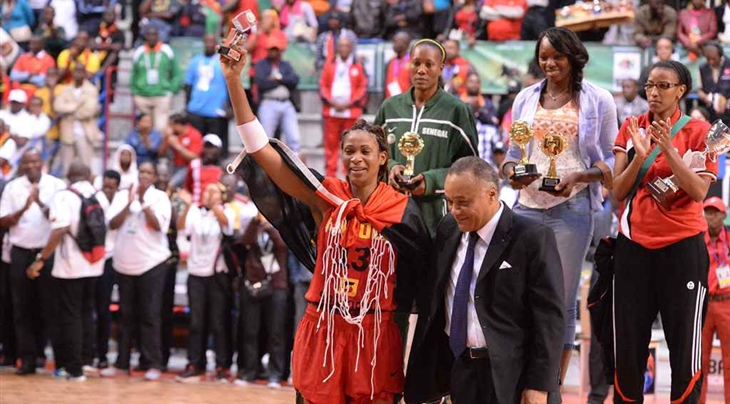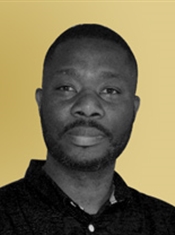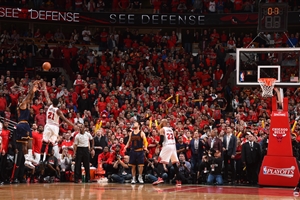
Two-time MVP Nacissela Mauricio talks AfroBasket Women 2015
SHEFFIELD (Julio Chitunda's African Message) - The 2015 edition of the AfroBasket Women got a little closer over the weekend with the announcement of the draw results for the tournament that will take place in Yaounde, Cameroon, from 24 September-3 October.
In Group A, hosts Cameroon will take on Mozambique, South Africa, Gabon, Uganda and Mali.
In Group B, defending champions Angola will square off against Senegal, Algeria and one team to be determined through a wild card invitation process, and other two teams will be decided through a qualifier.
The 12-team event is one of FIBA Africa's flagship event, where the best female players from the continent have built their names over the years.
Angolan Nacissela Mauricio, Senegal's Aya Traore and Mali's duo of Djene Diawara and Naignouma Coulibaly are some of the big names who have featured four or more times in the continental championships, and are expected to show up in Yaounde, battling for a place in the 2016 Olympic Games in Rio de Janeiro.
So, I thought, Mauricio, the MVP of the past two editions (2011 and 2013) of the tournament, is experienced enough to discuss the current, future and past of Africa women’s basketball.
I asked Mauricio to share with us what makes AfroBasket Women special, grabbing the attention of an international audience.
Big final today in the #AfroBasketWomen - Mozambique x Angola. 2 Portuguese speaking countries!! :) Should be an AMAZING game!!
— Ticha Penicheiro (@TichaPenicheiro) September 29, 2013
This is what she had to say.
Competitiveness and organisation
"Despite the FIBA [bwin] Ranking disparity between some African national teams, I have no doubt that this is going to be a tough and very competitive tournament because of the balanced level of the teams involved.
Over the past few years I have noticed significant improvement in organisational terms. - Mauricio
"Nowadays, with the exception of one or two, most national teams arrive at the competition scene in time. This was a recurrent problem years ago, when some national teams either arrived during the tournament, or, simply, did not show up at all.
"From the competitive stand point, I feel that, in recent years, local national federations have tried their best by preparing their national teams, holding international training camps, which boosts those teams' competitiveness. Some hold training camps in Europe for extended periods of time."
Tough opponents
"Senegal is always a threat, not only for us as the African champions, but also for other title contenders. They usually bring quality players, and are often well coached.
"It was a difficult to beat them in Maputo. As champions we are always prepared to face some adversity.
Nothing surprise us at AfroBasket Women anymore, because as the defending champions we are the team to beat. - Mauricio
"Everyone excels when they play against us.
Algeria
"We don't know much about Algeria, but now that we are in the same Group, I am sure our coaching team will watch film of their games and get us ready. I think Algeria might be one of those teams with good perimeter offense game, who pose threat to us.
What makes Angola different
"We have some advantages, such as the fact that most of us play together in the national team since 2004. With the exception of one or two players, most us play in the Angolan championship, making us more accustomed to one another.
First AfroBasket Women title
"From my experience, AfroBasket Women 2011 was clearly the most difficult tournament of all because we began with a defeat against Senegal, but we managed to bounce-back.
"Since then, each time I step on floor to representing Angola at AfroBasket Women, I have goose-bumps.
Pressure and future generation
"Obviously, we feel under pressure because an entire nation is expecting us to win another African trophy. Our fellow Angolan trust us, and we just need to stay focused and execute our game plan and fight to defend our African title.
"As one of the veteran players in the team, I try to encourage and keep our younger players motivated. I know what it is like to be young and play with among more senior players.
"I am not sure, but there is big chances of Jaime Covilha becoming the national team head coach. He is a hardworking man with a great ability of educating young men and women, not only in the basketball field, but also in life in general.
Knee injury
"As we speak I am still recovering from a knee surgery. This is a long process, and I am working to get ready for the Angolan national championship, which is due in June.
Sometimes leaving your camera on the wrong setting can pay off...Angola's Nacissela Mauricio #paolympics pic.twitter.com/tztBnxpm
— Ian Parker (@iparkysport) July 28, 2012
"As for the 2016 Olympic Games, I would not be honest with you if I said it does not motivate us. Of course, it does motivate me and my teammates, because we have lived that experience in London, three years ago. That's what makes this African championship extremely important for us."
Two years ago, Mauricio headlined the All-Tournament team along with Ramses Lonlack, Deolinda Ngulela, Leia Dongue and Astou Traore.
Off the court, she has served as Goodwill Ambassador for Angola to the United Nations Joint Programme on HIV/AIDS (UNAIDS) from 2013 to 2014.
Julio Chitunda
FIBA
FIBA's columnists write on a wide range of topics relating to basketball that are of interest to them. The opinions they express are their own and in no way reflect those of FIBA.
FIBA takes no responsibility and gives no guarantees, warranties or representations, implied or otherwise, for the content or accuracy of the content and opinion expressed in the above article.


























